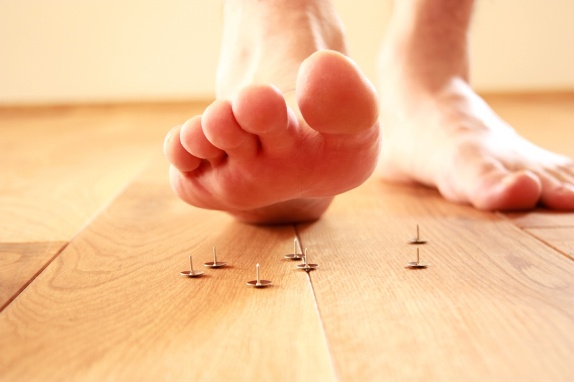Peripheral Neuropathy
About Peripheral Neuropathy

Peripheral neuropathy is caused by damage to your peripheral nervous system, which connects nerves from your brain and spinal cord to the rest of your body.
This disorder can cause your nervous system to send signals of pain in your feet when there is actually nothing causing the pain. Alternatively, it might not send a pain signal even if you have experienced an injury like a cut, burn or blister.
Symptoms of peripheral neuropathy might include tingling sensation, feeling like you’re socks are too tight, numbness, thinning of skin, changes in hair and nails, extreme sensitivity to touch and sharp electric-like pain.
Causes of Peripheral Neuropathy
Diabetes can cause nerve damage which is one of the most common forms of neuropathy. Symptoms could include numbness, loss of feeling and pain in your feet. This is why it is so important that patients with diabetics practice good diabetic foot care and have their feet checked regularly by a podiatrist.
Physical injury is the most common cause of nerve damage. Physical trauma caused by sports injuries, car accident or even holding still for too long in one position can cause neuropathy.
Infection and autoimmune disorders can attack nerves including: herpes simplex, shingles or chicken pox, Lyme disease, and HIV/AIDS. Patients with rheumatoid arthritis or with other chronic inflammation and damaging diseases can experience nerve pain in their feet.
Alcohol use and exposure to toxins can put you at risk for neuropathy. Chemicals like glue, solvents and insecticides as well as heavy metals like mercury and lead can all contribute to nerve damage causing neuropathy.
Diagnosing Peripheral Neuropathy
Your doctor will review your clinical and health history and might ask questions about your symptoms, lifestyle, family history, drinking habits and if you’ve had exposure to toxins. A physical examination will check for tendon reflexes, muscle strength and tone, and the ability to feel sensation.
An electromyography (EMG) is an electrical test that might be used to diagnose muscle weakness caused by neuropathy. The doctor will place a small needle into your muscle and ask you to move or flex it gently. Probes in the needle will measure the amount of electricity moving through the muscle, seeing if the electricity responds to the nerves controlling the muscles. A slow or reduced response might mean the patient has neuropathy.
A nerve conduction study might also be done. Tiny amounts of electricity are pulsed through the nerves via electrodes placed on the skin. This is to determine if the nerves are transmitting signals properly.
Treatment
There is no known cure for peripheral neuropathy. The goal of treatment is to slow the progression of the disease, maintain good foot health, decrease pain and discomfort. Your podiatrist may prescribe oral medication to help with the pain. Alberta Family Podiatry will perform regular check-ups to ensure you’re maintaining good foot health and to look for injuries and infections. We will show you how to conduct at-home checks of your feet and give you some instructions on how you can care for them at home. If you have peripheral neuropathy we suggest you visit our Calgary foot clinic for a check up at least once or twice a year.
Learn more about Diabetic Peripheral Neuropathy, complications and prevention techniques from the Canadian Diabetes Association.